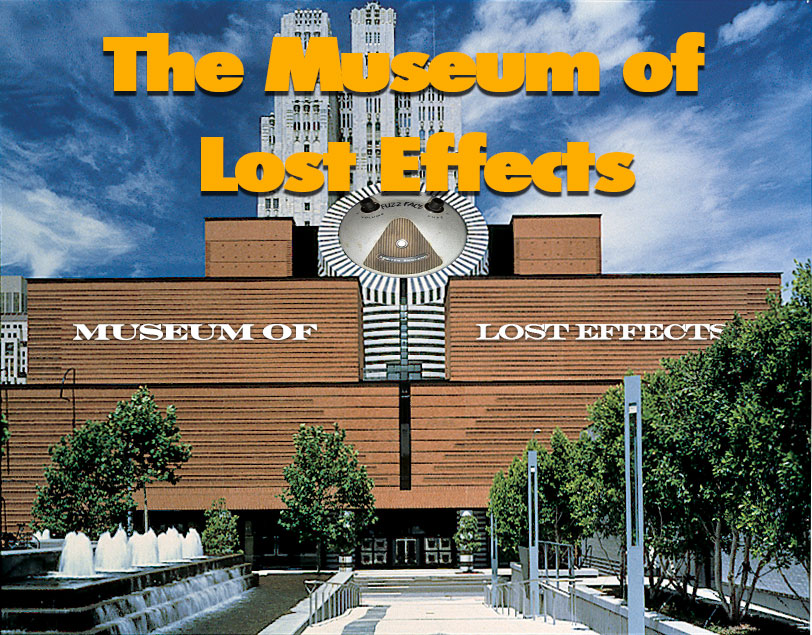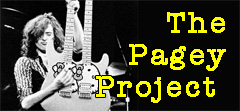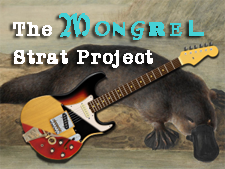Monday: Theory and Technique
Tuesday: Gear
Wednesday: Repairs and DIY
Thursday: Biography
Friday: Fiction
Tonefiend Book Week is simple: I discuss a few titles I’ve found particularly enlightening, useful, or entertaining, and then you jump in and do the same. I’ve organized the days of this week by subject matter. Today’s topics are musical biographies and autobiographies.
Classic rock fans have been rewarded with many cool autobiographies in recent years: Keith Richards’ Life, Patti Smith’s Just Kids, Bob Dylan’s Chronicles, Neil Young’s Waging Heavy Peace, and Pete Townshend’s Who Am I: A Memoir, to name a few. I’ve read Richards and Smith, and I plan to read the others. Any thoughts about those and similar titles?
And then there are the great jazz autobiographies, such as Miles Davis’s Miles and Duke Ellington’s Music is My Mistress. Despite their alleged omissions and inaccuracies, both are epic accounts of epic lives dedicated to epic music. (So which is better: a lively, lying-through-the-teeth autobiography, or a dry but truthful biography?)
But my favorite musical autobiography is Hector Berlioz’s Mémoires, first issued in 1865.

Hector Berlioz: total punk!
This, admittedly, isn’t a book for all musicians, or even most musicians. It concerns the explosive classical music scene of 19th-century Europe. If that topic holds no interest, the Mémoires probably won’t either.
But consider: Berlioz (1803-1869) is, along with Debussy, France’s greatest composer. He was a founder of Romanticism, and the first composer to fuse literature and instrumental music on a grand scale. He helped create the modern concept of orchestration and wrote the first orchestration manual. And of all the great composers, Berlioz is hands-down the best writer. He is arrogant, irreverent, sarcastic, and blisteringly funny. If you enjoy, say, the acidic humor of Mark Twain’s essays, you’ll dig Berlioz’s voice.
And like Twain, Berlioz played guitar. (More on that in a bit.)
The Mémoires drip attitude from page 1:
Needless to say, I was brought up in the Catholic faith. This charming religion (so attractive since it gave up burning people) was for seven whole years the joy of my life, and although we have long since fallen out, I have always kept the most tender memories of it.

Berlioz’s music was often less than subtle. Here’s one contemporary caricature.
…and it never lets up. We meet the era’s greatest composers and performers and learn what it was like to be a professional musician in an era before recorded music. Concerts were longer. Audiences were more passionate. Wars were waged in the music journals. If you think going on tour today is demanding, imagine it in an era of unpaved roads and horse-drawn carriages.
And as if the music and world around him weren’t dramatic enough, Berlioz spices things up with much wild behavior, notably his near-psychotic obsession with an Irish stage star, which inspired his greatest work, the Symphonie Fantastique, subtitled An Episode in the Life of an Artist.
What kind of episode? The kind where a lovesick artist OD’s on opium, only to have his beloved pursue him through his doped dreams. Things don’t end well: The artist meets the guillotine (the music depicts his head thumping down the scaffold steps). But wait — there’s more! He awakens at an orgiastic witch’s sabbath, where his love appears in grotesquely transfigured form before a nightmarish finale.
That’s our Hector! :satansmoking:
Berlioz was one of the few great composers who couldn’t play keyboards — and he was proud of the fact! His main instruments were flute and guitar. He left no music for the guitar, but he always kept one on hand, and probably used it as a compositional aid. Yet he did most of his work with only pencil and paper in order to avoid what we’d call “muscle memory” — the tendency for technically adept players to fall into comfortable but clichéd patterns. It’s certainly a frequent topic on this blog.
Berlioz wrote:
My father would never let me learn the piano. If he had, no doubt, I would have joined the noble army of piano-thumpers, just like 40,000 others….Sometimes I regret my ignorance, but when I think of the ghastly heap of platitudes for which that unfortunate piano is made the daily excuse — insipid and shameless productions that would be impossible if their perpetrators had to rely, as they ought, on pencil and paper alone — then I thank the fates that have forced me to compose silently and freely by saving me from the tyranny of finger-work, that grave of original thought.
“Finger-work…grave of original thought.” How true is that?
Finally, I have to quote one Mémoires passage that feels as if was written specifically for “guitar journalists.” Berlioz wrote frequently for the music periodicals of his day, but didn’t always enjoy the work.
I returned to my treadmill — journalism — once more, and oh, the horror of it!
The misery of writing an article to order on nothing in particular — or on things that, as far as I was concerned, simply did not exist because they excited in me no feeling whatsoever. Long ago I remember spending three days over a critique without being able to write one word. I cannot remember the subject, but I remember my torment.
I strode up and down, my brain on fire. I gazed at the setting sun, the neighboring gardens, the heights of Montmartre, my thoughts a thousand miles away. Then, as I turned and saw that confounded white paper with no lines on it, I flew into the wildest rage.
My unoffending guitar leaned against the wall. I kicked it to bits.
Man, are you sure you never worked at Guitar Player? That’s exactly how I felt when I had to write that idiotic cover story on [REDACTED].
You can download a digital copy of an old public domain translation of the Mémoires for free here. It reads well, though I prefer the 1969 David Cairns translation (out of print, but widely available used). It’s also easy to find public domain copies of the Mémoires in the original French, if you’re of that persuasion.
Hector gets the final word:
Time is a great teacher, but unfortunately it kills all its pupils.

Good, dirty fun!
But that’s another story.
Okay — your turn! What are your favorite accounts of musicians’ lives?








I read the Miles autobiography in a Spanish translation years ago and loved it. I’m not very fond of biographies in general, but one that I really enjoyed was “Confessions of a Guitar Player” by the late Tommy Tedesco. Had me laughing many times. Oh, wait, and the Bill Bruford autobiography is excellently written with a very fine British humor.
And, if it’s not very much off topic, I’d like to mention two books by Slonismky: “Lexicon of Musical Invective”, a compilation of mostly devastating reviews of many works by well known composers (which includes at the end an “invecticon”, that is, a catalog of insults in alphabetical order); and “the Book of Musical Anecdotes”. Of the later, this is my favorite quote: “The musician who invented swing ought to” (Anonymous).
Without doubt, one book I’d recommend to everybody – but especially to anyone with the slightest interest of the late-70s/early-80s Liverpool music scene – is Julian Cope’s autobiography “Head On” (which you can now find as a back-to-back – or should that be book-to-book – with its follow up, “Repossesed”.
It’s a story of music fanaticism, youthful enthusiasm, hedonism, using-someone-else’s-toothbrush-for-unspeakable-purposes-ism… all told with great humour – in fact I remember having to stop re-reading it on a long train journey once, as I couldn’t help but laugh out-loud.
From forming bands with other music fans that he met in the famous Eric’s club in Liverpool – some of such bands existing in name only, rather than, you know, writing songs and such – to forming the Teardrop Explodes and the contradiction of being seen as a pretty-boy pop star in the teenage music press, whilst at the same time being a notorious drug fiend who wore the same smelly leather pants every day for literally years.
I’m not sure I’ve sold the book particularly well to you all, but all I can say is it seems I’ve sold it to myself again… I’m compelled to go and read it again at the earliest opportunity!
As a side note, my previous favourite rock autobiography was Ian Hunter’s (Mott The Hoople) “Diary Of A Rock’n’Roll” star that I read in my teens (and then unfortunately gave away – apparently it’s quite a collector’s item these days!). that was a working musicians diary of the behind the scenes stuff that most people don’t get to see; and since it was back in the era when you could still pick up, say, Les Pauls in pristine condition for less than a hundred dollars from not-yet-wised-up pawn shops, it’s a book that makes one quite envious! I’m sure “Diary…” still stands up after all these years, but the Cope book kind of replaced it in my mind.
On the general point of autobiographies not necessarily being entirely accurate, in a sense, I don’t think that necessarily matters – inasmuch that often you can tell when someone is exaggerating some particular point, and it can be quite revealing just what things some people chose to exaggerate. so they might be telling you one thing but between the lines, you can tell something about them that they didn’t realise they were telling.
Oh man — the Cope books sound fun. Gotta get those! 🙂
I forgot to mention “The Frank Zappa Real Book”. This man is my hero. There is even a chapter entitled “Marriage as a Dada Concept”. How can you possibly top that?
I loved that book…I had it..I need it again..I laughed My ass off from the first paragraph to the very last..It is MUST READ!
In Spanish, “laughing your ass off” is said “partirse el culo de risa”.
You are right but I think we only use that expression in Spain. As far as I know it is not used in other spanish speaking countries.
I plan to start using it in the States. 🙂
It would be worth knowing if someone understands you!
Can’t wait to dive into Mémories. Definitely my next book.
I enjoyed the Andy Summers biography quite a bit. Not much to gather from a guitar perspective but interesting.
I loved *Just Kids* (and assigned it to my students!) and I’m looking forward to Richard Hell’s new book. If anyone is interested in the punk era in a broader (art) historical context, Greil Marcus’s *Lipstick Traces* is epic.
Thanks Joe, that first paragraph has won me immediately. And I agree with Freddie, I really enjoyed Zappa’s book.
Yeah — and it’s, like, the third paragraph in the book! 🙂
As I replied …I really loved the Zappa book,,,no one goes unscathed in it either,,,Im really looking forward to Steve Lukather’s upcomming Biography of session stories and vignettes due out in the near future.
Robert Gordon’s ‘Can’t Be Satisfied, the life and times of Muddy Waters’ is an excellent read, as is his book on Memphis music history (although I’ve forgotten the title of that one) – very humorous and insightful.
Lester Bangs’ ‘Psychedelic Reactions and Carburateur Dung’ is a great overview of post-60’s rock’n’roll with some cool interviews.
Cesar Glebeek’s ‘Jimi Hendrix, Electric Gypsy’ is notable for it’s exhaustive attention to minutae, as well as being an excellent cautionary tale for young rockers.
I don’t remember the author, but there was an excellent book written on T-Bone Walker (‘Stormy Monday’) back in the seventies.
Most of the autobiographies I’ve read seem excessively ghost written (BB KIng) or excessively not (Neil Young), with the exception of ‘Life’ which really reflects Keith’s voice. For the worst ghost-written autobiography of all time, check out Chet Atkin’s hopelessly quaint memoir.
The Clapton one could have used more ghost. Ok, you were an alcoholic, I get it. But surely you had _some_ fun…
Hee hee.
Lots of great stuff! I enjoyed Charles Delauney’s bio of Django Reinhardt when I first stumbled across Django: https://www.amazon.com/Django-Reinhardt-Da-Capo-Paperback/dp/030680171X
I should have mentioned Crosstown Traffic, Charles Shaar Murray’s Hendrix book. Sorry, man! (Charles drops in here sometimes.)
Read Just Kids a couple months ago, great book. It’s so well written and the story is great. One of those truth is stranger than fiction accounts. Supper fun read.
this is stretching the idea behind this thread even more than Billy G’s top E, but since it’s an album I like to champion, may I mention Lou Reed & John Cale’s “Songs For Drella”. it’s a musical biography of Andy Warhol and, given their close association is a very personal portrayal of the man, together with some great music.
Etta James’s Rage to Survive is some short of KR’s Life, but way wilder.
https://www.amazon.com/Rage-Survive-Etta-James-Story/dp/0306812622/ref=sr_1_1?s=books
If just received Rhythm and the Blues: A Life in American Music by Jerry Wexler. I can’t wait
https://www.amazon.com/Rhythm-Blues-Life-American-Music/dp/0312113765
BTW, I discovered this site yesterday and started building the Distorion pedal. Then I stayed up until 2:30 am reading articles and catching up… you really fucked up my productivity today (and I can’t wait to get home and finish my new pedal)
Hey, anytime I can ruin someone’s productivity, I call that a day well spent!
Seriously — glad you’re digging it. Don’t be a stranger. 🙂